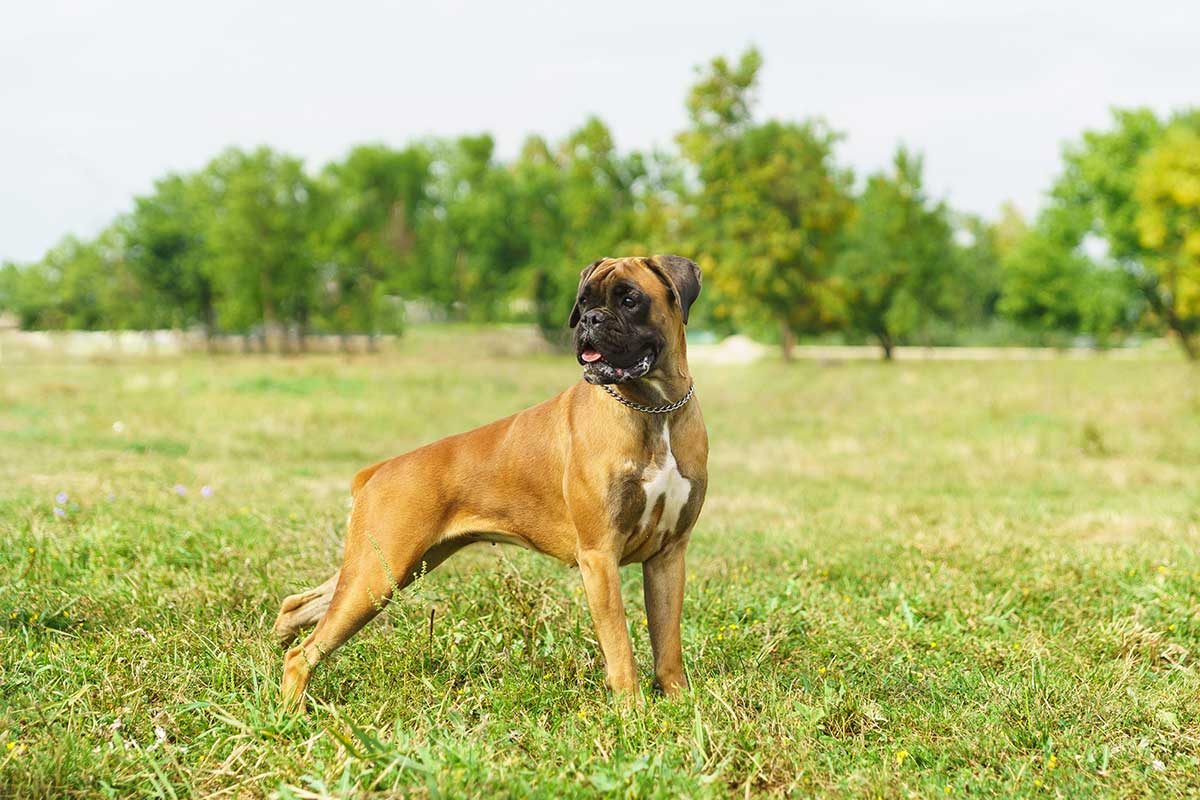The Boxer is an energetic, loyal, and intelligent breed known for its muscular build and playful nature.
Often referred to as the « Peter Pan » of dog breeds, Boxers retain their puppy-like enthusiasm well into adulthood, making them a favorite among families and active individuals.
Boxer : A Complete Guide to This Dog Breed
This article explores the history, physical characteristics, temperament, care needs, and health concerns of the Boxer breed. Whether you’re thinking about adopting a Boxer or simply curious about this beloved breed, this guide offers all the essential information you need.
The Origins
The Boxer’s origins can be traced back to Germany in the late 19th century, where it was developed as a working dog. The breed descends from the now-extinct Bullenbeisser, a German hunting dog used to track and hold large game like boars and bears.
Boxers were later refined for their strength, agility, and intelligence, becoming versatile working dogs used for guarding, police work, and companionship. Over time, their playful and loyal nature also made them popular as family pets.
Fun Fact: The name « Boxer » is thought to come from the breed’s tendency to stand on its hind legs and “box” with its front paws when playing.

Physical Characteristics of the Boxer
Boxers are known for their strong, athletic build and distinctive facial expressions. Here’s a detailed look at their physical traits:
- Size: Boxers are medium to large dogs, typically weighing between 55-70 pounds (25-32 kg) for males and slightly less for females.
- Height: They stand about 21-25 inches (53-63 cm) tall at the shoulder.
- Coat Color: Boxers come in two main coat colors: fawn and brindle, often with white markings. Some Boxers may have a white coat, though these are less common.
- Morphology: Boxers have a square, muscular body with a deep chest and a strong neck. Their short, smooth coat adds to their sleek appearance. Boxers are also known for their distinctive face, characterized by a broad muzzle, strong jaw, and expressive eyes. Their ears are naturally floppy, but some are cropped in countries where this practice is still allowed.
- Distinctive Features: One of the most notable features of the Boxer is its underbite, which gives the breed a characteristic expression of seriousness or curiosity. Combined with their expressive eyes, this makes Boxers easily recognizable.
Comparison: Compared to other working breeds like the Doberman Pinscher, Boxers have a more playful and energetic demeanor, making them better suited for families with children.
The Temperament
Boxers are known for their high energy, loyalty, and affectionate nature. They are often described as playful and protective, making them excellent family dogs.
- Interaction with Children: Boxers are great with children, thanks to their patient and playful nature. They are gentle and protective, often forming strong bonds with kids. However, their size and energy levels mean they can be a bit boisterous, so supervision is recommended around small children.
- Behavior with Other Animals: Boxers can get along well with other pets, especially when socialized early. They may exhibit a bit of dominance around other dogs but are generally friendly and playful. Socialization from a young age helps ensure they are well-mannered around other animals.
- Training Tips: Boxers are intelligent but can be stubborn at times. They respond best to positive reinforcement and consistent, firm training. Early obedience training is important to manage their exuberance and ensure they grow into well-behaved adults. Boxers thrive on mental stimulation, so training sessions that incorporate games and activities work well for them.
Care Needs for the Boxer
Boxers are active dogs that require regular exercise and proper care to stay healthy and happy.
- Coat Maintenance: The Boxer’s short coat is low maintenance and requires minimal grooming. Weekly brushing is sufficient to remove loose hair and keep their coat looking shiny. They are moderate shedders, and regular baths help keep their coat clean.
- Exercise Requirements: Boxers are high-energy dogs that need plenty of physical activity. Daily walks, runs, and playtime are essential to keep them physically and mentally stimulated. They enjoy playing fetch, running, and other outdoor activities, making them great companions for active individuals or families. Without enough exercise, Boxers can become bored and exhibit destructive behavior.
- Hygiene and Specific Care: Boxers’ short snouts make them prone to drooling and overheating, especially in hot weather. It’s important to keep them cool during exercise and avoid strenuous activities in extreme heat. Regular dental care is also essential, as their strong jaws and underbite can lead to dental issues if not properly maintained.
Common Health Issues
Like all breeds, Boxers are prone to certain health conditions. Being aware of these can help ensure your Boxer lives a long, healthy life.
- Hip Dysplasia: This genetic condition affects the hip joint and can lead to arthritis or lameness. Regular vet check-ups and maintaining a healthy weight can help manage the risk.
- Heart Conditions: Boxers are susceptible to heart problems, particularly a condition called Boxer Cardiomyopathy (BCM), which affects the heart’s ability to pump blood effectively.
- Cancer: Unfortunately, Boxers are more prone to certain types of cancer, such as mast cell tumors and lymphoma. Regular veterinary visits and early detection can improve outcomes.
- Brachycephalic Syndrome: Due to their short muzzles, Boxers are prone to breathing difficulties, especially in hot or humid weather. Avoid over-exertion and keep them cool in warmer temperatures.
- Life Expectancy: The average lifespan of a Boxer is around 10-12 years. Providing them with proper care, regular veterinary check-ups, and a balanced diet can help maximize their lifespan.
Life Expectancy and Quality of Life of Boxers
On average, Boxers live between 10 to 12 years, although some can live longer with proper care. Their quality of life largely depends on meeting their physical and mental needs.
- Maximizing Quality of Life: To ensure your Boxer lives a long and fulfilling life, provide regular exercise, mental stimulation, and a balanced diet. Boxers thrive in environments where they receive plenty of attention and are included in family activities. Routine vet visits are essential to monitor their health and catch any potential issues early.
Pros and Cons of Owning a Boxer
Advantages:
- Boxers are loyal, affectionate, and protective, making them excellent family dogs.
- They are playful and energetic, great for active families or individuals.
- Boxers are intelligent and can excel in various activities such as obedience, agility, and protection work.
Disadvantages:
- Boxers are high-energy dogs that require a lot of exercise and mental stimulation, which may not suit all households.
- They are prone to certain health conditions, including heart problems and cancer.
- Their playful nature and size can make them a bit overwhelming for small children or the elderly if not properly trained.
What to Know Before Adopting a Boxer
Boxers are best suited for active families or individuals who can meet their exercise and mental stimulation needs. Ideal owners include those who enjoy outdoor activities and can dedicate time to training and play. Boxers thrive in homes where they are part of the family and receive plenty of love and attention.
Before adopting a Boxer, it’s important to understand the breed’s energy levels and health concerns. Consulting with breeders or rescue organizations can help prospective owners determine if the Boxer is the right fit for their lifestyle.
Comparing the Boxer with the American Bulldog
Both the Boxer and the American Bulldog are strong, muscular breeds with protective instincts. However, Boxers tend to be more playful and energetic, while American Bulldogs are generally more laid-back. Both breeds make excellent family dogs, but Boxers may require more exercise and mental stimulation to prevent boredom.
Boxers are energetic, loyal, and intelligent companions that make wonderful pets for active families or individuals. However, their high energy levels and potential health concerns mean they require committed care and attention.
With proper research and preparation, owning a Boxer can be a rewarding and joyful experience for many years.









